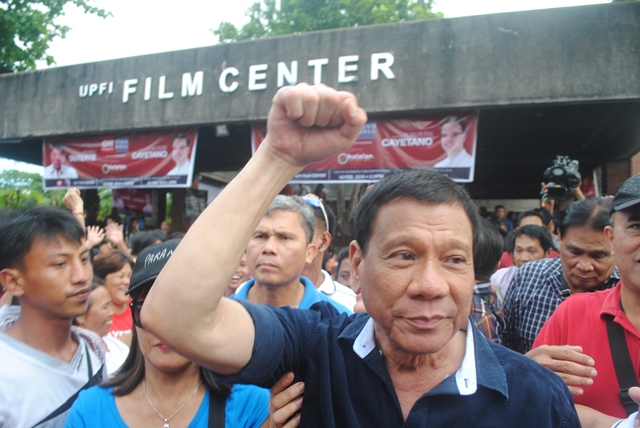Death Penalty: Legal, Rights Issues Ignored

President-elect Rodrigo Duterte at the UP Film Center for the CNN Townhall, February 18, 2016. Photo by Lito Ocampo
HIS PROMISE to eradicate crime in a span of three to six months was at the forefront of President-Elect Rodrigo Duterte’s campaign. Known for his tough stance on crime, Duterte announced in a May 15 press conference that he would urge Congress to restore the death penalty, preferably by hanging. He also vowed to enforce a “shoot-to-kill” policy for criminals who resist arrest.
This drew adverse reactions from human rights advocates such as the Commission on Human Rights (CHR), Amnesty International Philippines, as well as the Catholic Church, which said that capital punishment has not been scientifically proven to deter crime. The nongovernment organization Volunteers Against Crime and Corruption (VACC) welcomed the idea, however.
Documenting the reactions of several groups to this issue was the main focus of reports following Duterte’s announcement. Reports from GMA-7 and CNN Philippines tracked the status of capital punishment in past administrations: It was abolished in 1986 during the Cory Aquino administration, implemented as law in 1993 during the Fidel Ramos administration, and repealed by Gloria Macapagal- Arroyo in 2006.
But hardly anyone in the mainstream press looked into the implications of its reinstatement, whether there’s really a reason for it, or even if it is lawful or not. There was no follow-up on what exactly the implications and impact would be of a public hanging. Is it humane? Is it even legal?
The media also totally ignored Duterte’s “shoot-to-kill” policy statement. Keeping in mind that “shooting suspected criminals that fight back” has become the default–even de rigueur–justification by Duterte for the killings in his city that have been attributed to the Davao Death Squad, this should have been explored by the press. The rules of engagement during police operations would be a logical and important topic of follow-up discussions. Some police officers’ ignoring the rules of engagement should also have been taken into account.
Existing Laws and Agreements
Beyond quoting Duterte’s intention to restore the death penalty, the press should have also explained the existing Philippine laws and international agreements to which the country is a signatory relevant to the capital punishment issue to provide the context that would enable citizens to understand the legal and international implications of the Duterte plan.
The 1987 Constitution provides that “The death penalty shall not be imposed unless for compelling reasons involving heinous crimes, the Congress hereafter provides for it. Any death penalty already imposed shall be reduced to reclusion perpetua.” This provision made the Philippines the first Southeast Asian country to abolish the death penalty. But there was no discussion in the mainstream press about the constitutional caveat on heinous crimes in the context of Duterte’s approach to crime, for example.
Internationally, the Universal Declaration of Human Rights (UDHR) adopted by the United Nations (UN) General Assembly recognizes and upholds fundamental rights, including the right to life.
The Philippines is also bound by the Second Optional Protocol to the International Covenant on Civil and Political Rights (ICCPR), a UN Treaty that the country signed in 2006 and ratified a year later without reservations.
Adopted by the UN General Assembly in 1966 and enforced in 1976, the ICCPR obligates countries that ratified it to protect and preserve basic human rights, primarily the right to life. Having signed and ratified the protocol, the Philippines commits to the abolition of death penalty definitively.
This information was only reported by media almost a week after Duterte’s announcement, and only after Amnesty International and the Free Legal Assistance Network (FLAG) held a press conference and released a statement, respectively.
Reports from Rappler, Philippine Daily Inquirer, The Standard, The Manila Times and GMA News Online cited statements made by the two organizations.
Romeo Cabarde, vice chairman of Amnesty Philippines, said that reviving the death penalty would not be a successful crime deterrent. Implementing capital punishment also implies that the country’s justice system is not working, Cabarde said, and that “if that’s the root of criminality, then I think we have to hit the target at its very root.”
“These actions (the death penalty and a shoot-to-kill policy) are illegal and unconstitutional, render our legal system impotent and meaningless, and blatantly violate international law,” said FLAG’s Jose Manuel Diokno. The poor, he added are also the most vulnerable to these policies, since they lack the resources to hire good lawyers and subsequently bear the brunt of being wrongfully accused and sentenced.
Policy reporting remains a challenge to media, and the public deserves reports that are anchored on research and the knowledge of experts. In reporting the death penalty, the media could have explored its legal implications and the options available in solving the country’s persistent crime problem. More important, the press should have resisted the temptation to just swallow unthinkingly and uncritically everything President-elect Duterte says.
Leave a Reply